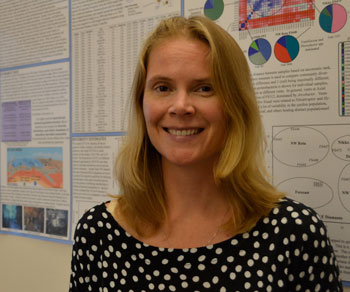Julie Huber Named Associate Director of NSF Center for Dark Energy Biosphere Investigations

MBL microbial oceanographer Julie Huber has been appointed associate director of the Center for Dark Energy Biosphere Investigations (C-DEBI), an NSF-supported Science and Technology Center at the University of Southern California. Huber continues in her present positions at MBL, which include associate scientist and associate director of the Bay Paul Center for Comparative Molecular Biology and Evolution, and assistant professor in Ecology and Evolutionary Biology at Brown University (through the Brown-MBL Partnership and Graduate Program).

Interdisciplinary research at C-DEBI is focused on discovering and describing the microbes in the rocks and sediments of the ocean floor. A common feature of all deep subseafloor habitats is that they exist in the dark -- far removed from the photosynthetic activity that fuels microbial cycles at the ocean's surface. Very little is known about how energy is cycled, and life is maintained, in this dark, deep biosphere. "We know far less about the deep biosphere than we do about the surface of the moon," says MBL senior scientist Mitchell Sogin.
By exploring the dark energy biosphere, C-DEBI scientists are addressing significant unknowns about life on Earth and beyond, including:
- What is the nature and extent of life on Earth?
- What are the physico-chemical limits of life on Earth?
- How metabolically active is the deep subseafloor biosphere? Are there exotic metabolic processes occurring?
- How are microbes dispersed in the deep subseafloor biosphere?
- How does life evolve in deeply buried geological deposits beneath the ocean floor?
These research findings, in turn, can impact major fundamental questions about energy creation, climate change, and the nature of evolution of life on Earth.
Huber, who received her Ph.D. in Biological Oceanography from the University of Washington, joined the Bay Paul Center in 2005. In 2006, she was on the team that published the first paper to describe marine microbial diversity using next-generation genetic sequencing. An ocean-going microbiologist who studies microbial life at hydrothermal vents and in the subseafloor, Huber has logged more than a year at sea, including her leadership of a Schmidt Ocean Institute research cruise in September 2013 to Axial Seamount, an active volcano 300 miles off the Oregon coast. Her research is funded by a variety of agencies, including the Gordon and Betty Moore Foundation, NSF, NASA, and the Alfred P. Sloan Foundation’s Deep Carbon Observatory.